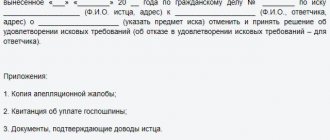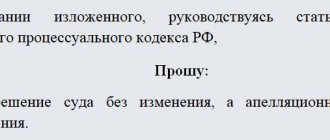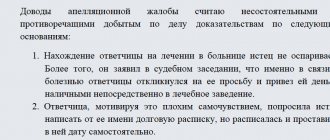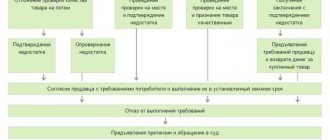Most common reasons for appeal
During the trial, authorized persons use the rules of the law, which allows them to resolve each individual dispute. Among other things, the use of previously adopted acts of justice and various examples from practice is allowed. Unfortunately, even this approach does not guarantee that the decision made will not contain errors that affect the interests of one of the participants in the proceedings.
Of course, a person whose rights and interests are infringed by the decision can appeal the document. However, before proceeding with the procedure itself, you need to clearly understand the essence of the violations. The most common reasons for appeal are the following violations:
- Failure to comply with the rules of the procedural code, which had a negative impact on the outcome of the proceedings;
- Some materials on the case were ignored, evidence was not fully taken into account;
- There is reason to believe that the decision was made under the influence of third-party factors, and therefore cannot be considered objective.
In other words, it is necessary to quickly establish the basis for the appeal and form a base of evidence based on it. According to experts, this mechanism will be relevant both in the case of a negative verdict and in a situation where the actual act of justice has even slight differences from the expected one.
To which authority should I file a complaint?

A person who has an objection to the decision made can appeal the act of justice, but first of all, you need to decide where exactly to send the papers. The wrong choice of authority will lead to the fact that the complaint will not be considered, but will be returned to the author. To prevent such consequences, the following order should be followed:
- The decision made by the magistrate court can be appealed by filing documents with the district court;
- An act of justice passed by a district court can be appealed in the courts of the constituent entities;
- The competence of the judicial panel of the Supreme Court includes the review of cases of the above-mentioned instances;
- If it is necessary to reconsider a decision previously studied by a judicial panel, the final authority is the appeal panel.
What is the procedure for filing an appeal?
The law provides for several appeal options. Their use is directly related to the status of the act of justice and the authority that issued the first verdict. Among other things, it is important to take into account the time period that has passed since the moment the appealed document entered into legal force.
Most often, an appeal against a court decision in a civil case is carried out through the procedure of appeal or cassation. Each option has its own individual characteristics and provides for certain conditions of use.
In particular:
- Filing an appeal is possible only if the act of justice has not yet gained full force. Thus, the decision can be appealed within 30 days from the date of publication. In essence, the appeal process is a new trial in which participants have the opportunity to present new evidence. The decision subject to appeal is annulled, and a new one is adopted in its place.
- A cassation appeal is filed in cases where a decision that has gained legal force is being appealed. The disadvantage of this option is the fact that when reviewing the case, the court will take into account only those materials and evidence that have already been presented earlier. The result of the process will be the cancellation of the appealed decision, and in some cases, its declaration as invalid. A cassation appeal can be filed within 6 months, starting from the moment the decision entered into force of law.
As practice shows, filing an appeal is the most common in civil proceedings. This is not difficult to explain, since the initiator of the process gets the opportunity not only to have the case reviewed, but also to present new evidence on it. As for the timing, 30 days is enough to prepare all the papers.
The first stage of cassation appeal against court decisions in a civil case
According to the accepted procedural scheme, in order to file a cassation it is necessary to go through the stage of appeal. A cassation protest cannot be filed if the civil case was considered only in the court of first instance. The addressee of the cassation appeal is the Presidium of the court of the constituent entity of the Russian Federation. This may be a court of a region, a republic, a federal city, an autonomous district or a region.
When preparing a cassation appeal, you should adhere to the same rules as when preparing an appeal. Simultaneously with the complaint, the applicant may file a petition to suspend the effect of the appealed court decisions. The judge will consider the protest and decide whether to forward it to the Presidium or reject it.
The Presidium, in turn, considers the complaint and makes one of the possible verdicts:
- leave the complaint unsatisfied and the previous decision unchanged;
- cancel a previously made decision in part or in full, order a review of the case;
- leave one of the adopted judicial acts in force;
- cancel or change the appealed decision without a new consideration of the case;
- cancel the previous court decision in whole or in part, terminate the proceedings.
If at the first stage of cassation the decision of the magistrate's court was considered, the next stage is possible only when a decision is made. If, based on the results of the cassation, the court makes a ruling, the appeal process is considered completed.
Features of the appeal procedure

The subject of civil proceedings is a dispute between subjects concerning property or personal interests. As mentioned earlier, the first stage of the procedure for appealing a decision made in such a case is the choice of an authority, after which the initiator of the process can begin collecting and preparing documents. Studying the current legislation, analyzing similar cases, and consulting a qualified lawyer will help you avoid making mistakes. The appeal procedure itself provides for certain regulations, including the following stages:
- Receiving the primary act of justice;
- Writing a complaint listing all claims against the court decision;
- Choosing an appeal procedure (appeal or cassation);
- Sending papers to a higher court;
- Participation in proceedings;
- Familiarization with the final decision.
Collection and preparation of documents
If we consider an appeal of a court decision made in a civil case, it can be noted that, in fact, this is a new trial, during which not only materials and evidence will be taken into account, but also an act of justice adopted earlier. The preparation of a package of papers must be approached very responsibly.
It should be understood that most of the documents that will be needed during the preparation process have already been sent to the archive, which means that the initiator of the procedure will have to send a request to receive originals, duplicates or copies of papers. It would be a good idea to seek advice from an experienced lawyer who can explain all the nuances in detail and check the documents for errors. When filing a complaint, special attention should be paid to several points:
- The name of the court to which the papers are sent;
- Personal information about the plaintiff and his contacts;
- Individual information about the defendant and his contacts;
- Description of the essence of the dispute;
- A detailed explanation of the reasons for reviewing the case;
- Possible ways to resolve the dispute;
- List of applications.
When the entire package of documents has been collected, it should be sent to the secretariat, supported by a receipt confirming payment of the state duty. The first meeting, the purpose of which is to familiarize yourself with the available materials, is scheduled within 14 days from the date of submission of documents.
The initiator of the appeal must understand that the outcome of the proceedings can be influenced not only by verbal arguments and references to the law, but also by the behavior of the author of the complaint during the hearings and their adherence to the established rules.
Experts indicated which questions remained unexplained
Commenting on the “AG” resolution, lawyer of Borodin and Partners, Olga Rogacheva, noted that the Plenum of the Supreme Court quite logically indicated the preservation of the procedural powers of the presidiums of courts and judicial panels to consider complaints and submissions filed before the start of the activities of the courts of appeal and cassation. “It should be noted that the resolution reflects organizational issues of the rules for considering submitted complaints (submissions).
I think that from the moment the cassation and appeal courts operate, issues may arise that need to be resolved,” she added.
Senior partner, head of the practice group of the INTELLECT law firm, Roman Rechkin, noted the absolute need for clarification by the Supreme Court, since Law No. 451-FZ contains laconic, in the expert’s opinion, transitional provisions that are insufficient to resolve all issues that will arise in connection with the creation and start of operation of fourteen new ships.
“For example, it is reasonable and significant to clarify the situation when a complaint is filed after the date of creation of the appellate (cassation) court by a person participating in the case, if there is a complaint previously filed by another person, accepted for proceedings by the “old” court. Such a complaint is subject to consideration by the court in whose proceedings the previously filed complaint is pending, according to the rules in force until the day the newly created courts begin their activities,” he explained.
This rule, the expert added, is not obvious, and does not directly follow from Law No. 451-FZ.
“Unfortunately, the resolution is not exhaustive, since it is of a general nature, without taking into account the procedure for creating and starting the activities of specific courts,” added Roman Rechkin. – It is necessary to take into account that cassation and appeal courts of general jurisdiction are considered formed from the date of appointment of at least half of the established number of judges of the relevant court.
The decision on the day when these courts begin their activities is made by the Plenum of the Supreme Court, officially notifying about this no later than October 1, 2020. That is, based on these rules, the moment when the 14 courts begin their activities will not coincide: apparently, they will begin to function in groups, at different times , until October 1."
Due to the fact that the newly created courts will be formed unevenly, a situation is possible, the expert believes, when in a certain territory an appellate court has been formed, but a cassation court has not yet been formed. “It turns out that a cassation appeal against a judicial act of the court of appeal should be considered in cassation by the presidium of the court of a constituent entity of the Russian Federation (that is, the “old” cassation) - formally a lower court.
Whether this is true or not is not explained in the resolution,” he concluded.
According to the managing partner of Bartolius Law Firm, Yuliy Tay, the adoption of the resolution should be welcomed, “since any uniformity in practice is always useful and meets the principle of equality before the law and regulatory certainty.”
These clarifications, the lawyer added, are of great practical importance: “The operation of procedural norms during any transition period - especially during such a global judicial reform - is important,” he explained. – The Constitutional Court has repeatedly demanded that the legislator and the Supreme Court comply with the principle of maintaining citizens’ trust in the behavior of the state – that is, the impossibility of changing the rules of the game.
Another thing is that the Supreme Court should care not only about the functional convenience of judges and participants in the process, but also about a certain doctrinal unity in the application of rules on the operation of the law over time.”
As a general rule, Yuliy Tai added, procedural rules are valid in the wording when they are applied. “So, in p.
2 of the resolution postulates a very controversial and, moreover, contradictory rule: after the new cassation courts begin their activities, the “old” courts continue the review procedure, and in accordance with the “old” procedural order, which violates the above rule. It is clear that the Plenum is concerned about convenience and reducing technical delays (problems) associated with the transfer of cases, the identification of new judges, etc.
But we know where the road generated by good ideas leads. In fact, there will be a certain period of functioning of two parallel cassation reviews.
There will actually be no equality before the law and the court, which is not only wrong, but also unacceptable,” he emphasized, adding that the last paragraph of this paragraph provides for the opposite mechanism of action of the new procedural rules in relation to the appellate courts.
This is important to know: Temporary disability benefit: what it is, who is entitled to receive it, the amount of benefits in 2020, the duration of payments
The lawyer noted that paragraph 4 of the resolution gives the same different interpretation for the procedure for reinstating the deadline. “I’m not saying that this position is wrong,” he noted, “but, in my opinion, it is not optimal.”
Expert opinion
Davydov Alexander Yurievich
Civil law consultant with 20 years of practice. Author of numerous articles on legal topics
The expert also drew attention to paragraph 5, which states that persons who took advantage of the review in the presidiums of the courts of the constituent entities of the Federation cannot file complaints with the new cassation courts, but can appeal to the judicial panel of the Supreme Court.
“This is correct,” the expert believes. “However, it is further stated that the “old” procedural legislation will be applied, which violates the rules on the operation of the procedural law in time.”
Yuliy Tai also believes that the explanations are not exhaustive. “As the classic wrote, “theory is dry, my friend, but the tree of life grows green.”
It is objectively impossible to predict all the problems, but, I believe, the Supreme Court should resolve the issue of the timing of the cassation appeal, taking into account its changes for those cases where the appeal was considered before the emergence of new cassation courts and the persons participating in the case did not exercise the right to appeal under the old ones rules - that is, let’s say the appeal made a ruling on July 1, this year. g., by October 3, the three-month period had expired, but the six-month period had not,” he concluded.
What do you need to know about the hearing itself?
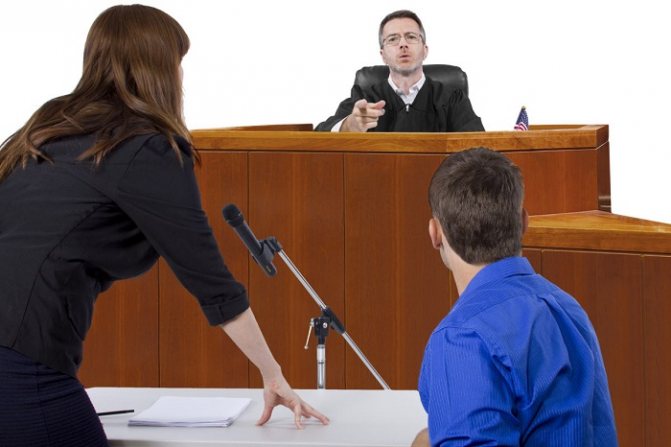
There are situations when applicants do not even have to collect new evidence to appeal an act of justice. In particular, we are talking about using the court record as evidence. This document contains all the information about the process, allows you to assess the objectivity of the judges and detect possible errors. When preparing to appeal, you should also take into account some nuances:
- Officials and judges who are participants in the first trial can become witnesses in the case;
- The rules for rendering a verdict and the rules of the hearings are similar to the standard ones;
- Notice of filing an appeal or cassation must be sent to all participants in the proceedings;
- If new facts are discovered during the proceedings, the court may order additional research or require the provision of relevant documents.
There are cases when an appeal does not bring the desired result, or, in the opinion of the applicant, there are still points in the decision that require revision, the solution to the problem will be to appeal to a higher authority. The final authority is the Supreme Court. Acts of justice adopted by him are not subject to appeal. The only exception is actions performed within the framework of international legal relations.
The most private and open legal portal
Hi all. Today on the menu is a short guide on the timing of the entry into force of a court decision. I have written about this in passing many times, but now I realized that in some things it is better to go deeper and consider seemingly obvious questions in more detail.
As you may know, a court decision does not take effect immediately. The Law provides the parties with a period during which they can appeal a decision that has not entered into force. And this point is regulated by Article 321 of the Civil Procedure Code of the Russian Federation.
According to part two of this very article, an appeal can be filed within a month from the date of the final court decision. I have spoken about this more than once, so you should know about it.
But here’s a question you may have: how to correctly calculate this monthly period so as not to be late in filing an appeal? And so that you don’t rack your brains, I’ll tell you how this very period is calculated correctly. There is nothing complicated here, almost pure mathematics.
And the Resolution of the Plenum of the Supreme Court of the Russian Federation No. 13 of June 19, 2012 “On the application by courts of the norms of civil procedural legislation governing proceedings in the court of appeal” will help me explain this simple science.
Paragraph 6 of this Resolution is specifically devoted to issues of procedural deadlines. So, remember.
The monthly period for filing an appeal begins on the day following the day of drawing up a reasoned court decision (or adoption of a court decision in final form), and ends in accordance with Article 108 of the Code of Civil Procedure of the Russian Federation on the corresponding date of the next month. This conclusion is based on the provisions of Part 3 of Article 107 and Article 199 of the Code of Civil Procedure of the Russian Federation.
In practice it looks like this. The court made a decision, for example, on 01/10/2015. Considering that the court has 5 days to make a decision in final form, our decision date will be 01/15/2015. Thus, from 01/16/2015.
Your monthly period for appealing the decision begins to run out, and it ends on February 16, 2015 inclusive.
But never wait until the last day. There is a risk of missing the deadline due to different approaches to calculations.
But this does not always happen, so read the dates indicated in the decision and build on them. For example, the court may make a decision on February 1, 2020, and, a few weeks later, give you a copy of the decision, which will indicate that it was made in final form on February 1, 2020.
And then you only have 2 weeks left to appeal.
Many readers ask me the question: how to correctly understand this period? Should a participant in the process, within these 30 days, receive a copy of the decision, prepare an appeal and submit it to the court?
It’s like yes and no here. On the one hand, if you are going to submit your appeal to the court in person, you must meet this deadline. If you plan to send your complaint to the court by mail, these explanations will definitely be useful to you.
So here it is. The deadline for filing an appeal is not considered missed if it was submitted to the postal service organization before twenty-four hours of the last day of the deadline (Part 3 of Article 108 of the Code of Civil Procedure of the Russian Federation).
In this case, the date of filing the appeal is determined by the stamp on the envelope, a receipt for the receipt of registered mail or another document confirming the receipt of correspondence (a certificate from the post office, a copy of the register for sending mail, etc.).
Yes, since I started talking about the appeal, it would not be amiss to tell which court you need to file your complaint. So, according to Part 1 of Article 321 of the Code of Civil Procedure of the Russian Federation, an appeal is filed through the court that made the decision.
Expert opinion
Davydov Alexander Yurievich
Civil law consultant with 20 years of practice. Author of numerous articles on legal topics
At the same time, this norm explains that an appeal can also be filed directly with the appellate authority. However, such a complaint will be sent to the court that made the decision in order to comply with all necessary procedural steps.
In other words, although you can send your complaint directly to the appeal board, I do not recommend doing so. You'll just waste time. Although, again, if the purpose of your appeal is to stall for time, you can take advantage of this opportunity.
That's all for today. Don't get sick, waves of flu are sweeping across the country right now. I'm already caught.
After the court's verdict, one of the parties to the proceedings may remain dissatisfied with the decision made.
Even if the act came into force and began to be implemented, the law allows its cancellation provided that the rights of one of the parties were violated.
Dear readers! Our articles talk about typical ways to resolve legal issues. If you want to find out how to solve your particular problem, call the free consultation numbers:
This is important to know: Rules and procedures for returning goods purchased in an online store
What problems are typical for administrative disputes?

If we talk about administrative law, it includes the relationships of the subjects of the Federation in the economy, society, social sphere and other similar areas. Often the subject of the proceedings are conflicts with government agencies and administrative violations. We must also not forget that there are certain requirements for the status of the participants and the very subject of the dispute.
The law provides for 2 forms of office work - simplified and ordinary. It is important to take into account that a verdict rendered in a simplified manner will take effect after 15 days, which means that there may not be enough time to appeal the court decision through an appeal, and you will have to file a cassation.
However, if one of the parties had valid reasons that prevented the timely filing of an appeal, it is possible to apply for a temporary suspension of the decision, while simultaneously filing a complaint. As for the rules of the appeal procedure, it is almost identical to civil proceedings and includes the following stages:
- Formation of a claim;
- Collection of additional materials and evidence on the case;
- Submitting papers to the appropriate authority;
- Attendance at the trial;
- Familiarization with the decision made.
When appealing an act of justice in cassation, documents should be sent to the Presidium of the court of the relevant entity, in order to deeply study the circumstances of the verdict. It is important to take into account the fact that it is impossible to support the complaint with evidence that was not previously in the case, and also to attract new witnesses. After consideration of the complaint, the first decision will remain unchanged, undergo some adjustments, or be canceled completely.
In order for the cassation court to decide to annul the first verdict, when submitting papers, photocopies of all acts of justice certified by the court that adopted them should be attached to them. It is these acts that will allow us to give an objective assessment of the process, analyzing its objectivity and compliance with legal requirements.
Appealing a court decision in a civil case in a supervisory procedure
The law allows you to appeal the decision of the Judicial Panel within three months. The Presidium of the Supreme Court of the Russian Federation will consider the supervisory complaint. The decision to transfer the complaint for consideration or to refuse the applicant is made by the judge alone. Only the Chairman or Deputy Chairman of the Supreme Court can cancel his verdict.
Filing a supervisory protest may lead to the following consequences:
- the complaint will be left without consideration on the merits;
- the applicant will be refused to submit the complaint for consideration;
- the complaint will be considered by the Presidium of the Supreme Court and a decision will be made.
The next authority for filing a supervisory appeal is the Chairman of the Supreme Court. If there is no positive result, the court decision can only be appealed to the European Court of Human Rights (ECtHR). However, practicing lawyers know that most court cases end at the stage of appeal and, less often, cassation. In the future, the effectiveness of appeal decreases when moving from one instance to another. The chances of successfully appealing a judicial act to the Presidium of the Supreme Court are minimal, not to mention the ECHR.
Features of appealing a decision made by an arbitration court

In the modern world, arbitration courts play a special role. In essence, we are talking about non-state structures involved in the consideration of cases of an economic or economic nature. This procedure requires the consent of both participants. It should be taken into account that the list of powers of the arbitration court is much shorter, but at the same time, there are a large number of advantages.
For example, if you believe the opinion of the majority of experts, an appeal of a court decision made by this authority cannot be contested. However, it all depends on which of the following points was noted in the agreement signed by the participants before the start of the proceedings:
- Conflict resolution exclusively through arbitration. The choice of this item will indicate that the decision made is final and not subject to appeal. Any complaint filed will be rejected.
- Dispute resolution is permitted in arbitration court or government agencies. This option is more preferable, as it allows the participants in the proceedings to appeal the verdict in the manner prescribed by law.
It should be noted that the appeal procedure itself, regardless of the order in which it is carried out, is completely identical to that described above. In most cases, disputes arising from arbitration are within the competence of civil law. As for filing a complaint, this procedure should be treated with the utmost care. It is recommended to consult with an experienced lawyer and ask for his assistance in preparing documents and forming an evidence base.
Is it possible to appeal an arbitration court decision in a civil case?
Arbitration courts are engaged in resolving business and economic disputes between constituent entities of the Russian Federation. Most of these disputes relate to the sphere of civil law and are regulated by the Civil Code. Arbitration courts are actually non-state structures. Compared to government agencies, they have fewer powers, but also have some advantages. One of them is to conduct proceedings in an expedited manner.
The verdict of the arbitration court can be challenged on the basis of the legislation of the Russian Federation. To do this, it is necessary that the agreement between the parties to the conflict and the court contain a clause on the possibility of settlement in government institutions. You have three months to appeal from the date of the final resolution. The complaint is submitted to the office of the district court, where the meetings of the arbitration body took place.
The most common reasons for appeal:
- the court lacks authority to consider this case;
- violation of legal norms when rendering a verdict;
- the defendant was not informed about the start of the proceedings, so the case was heard without his participation;
- the composition of the arbitration tribunal did not correspond to the nature of the proceedings.
When preparing a protest against an arbitration tribunal's decision, certain standards must be adhered to. In many ways, they are similar to the standards for filing an appeal and cassation complaint. Before drawing up a document, it is better to consult with a lawyer, otherwise the court may reject the complaint without consideration. A professional will give useful recommendations and help you comply with the deadlines and procedures for appealing the verdict of the arbitration court.
